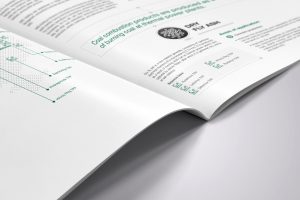
GRAWE Ukraine Insurance Company (Kyiv) in 2019 collected UAH 97.438 million in net premiums, which is 27% more than a year earlier, according to the annual report of the company, published in the information disclosure system of the National Securities and Stock Market Commission.
According to its data, gross premiums for the year amounted to UAH 115.026 million, which is 21.7% more than in 2018. Premiums transferred to reinsurance remained at almost the same level of UAH 8.138 million. The reserve of unearned premiums increased by 11.3%, to UAH 10 million.
In 2019, the company paid customers UAH 58.592 million, which is 26.6% more than a year earlier.
The company’s administrative expenses for the year increased by 32.3%, to UAH 18.136 million, sales expenses by 13.8%, to UAH 40.502 million.
As reported, GRAWE Ukraine Insurance Company in 2019 saw a net loss of UAH 30.345 million, while in 2018 some UAH 16.5 million. Over the year, it increased assets by 5%, to UAH 119.537 million.
Net worth decreased by 23.8%, to UAH 41.583 million. Charter capital, as before, is UAH 41.13 million.
The long-term liabilities of the insurer increased by 43.3%, to UAH 59.814 million, while current liabilities increased by 3.5%, to UAH 18.140 million.
Debtor indebtedness rose by 52.7%, to UAH 12.422 million. Cash and cash equivalents decreased by 18.6% and amounted to UAH 15.009 million.

UMG Investments, which combines the mineral extraction and processing assets of SCM financial and industrial group, has acquired a minor stake in Feednova, which is implementing a project to build a plant for the production of high protein feed additives and animal fat in Busk (Lviv region), according to a Feednova press release.
“We, as a local investor, understand that without new projects, without creating jobs and supporting business processes in portfolio companies, there will be no rapid economic recovery after overcoming the pandemic. We keep moving along all the previously agreed investment projects, and we are glad that our investment in Feednova helps create the first independent livestock by-product processing operator in Ukraine,” UMG Investments CEO Andriy Horokhov said.
Feednova said the financial details of this agreement were not disclosed.
Feednova is expected to process raw materials from external suppliers to produce feed additives and animal fat for farm and domestic animals. It is planned that the complex will have four production lines and five boilers (Mavitec, the Netherlands) with a capacity of more than 220 tonnes of raw materials and 90 tonnes of finished products per day. It is expected that up to 100 jobs will be created.
UMG Investments is an investment company with a focus on developing business in the raw materials and processing sectors. It was founded in 2006 by SCM Group. UMG Investments manages portfolio companies in the following sectors: mining, management of by-products and industrial waste, industrial goods and services. The market value of the assets managed by the company exceeds $500 million.

The RDS group of road construction companies as part of the tender of the Automobile Road Service in Luhansk Region won by the group with the approved cost of UAH 816.99 million will repair 32 km of the road on the section from the city of Schastia to Novoaidar on the N-21 highway, which connects Severodonetsk and Stanytsia Luhanska.
“In the city of Novoaidar, we have built a production base. Investment has already reached some $3 million. There will be an Amomatic-LMK VS 240S asphalt concrete plant with a capacity of 240 tonnes per hour. From here we will supply all inert materials and asphalt to the site,” the co-owner of the group, Yevhen Konovalov, told Interfax-Ukraine.
According to information in the ProZorro system, the expected purchase price was UAH 832.5 million, the competitors of RDS, which was represented by Rostdorbud LLC in this tender, were Avtomahystral-Pivden LLC and Onur Construction International LLC. The contract with the winner was signed this week.
Konovalov said that the company will have to carry out the following work: shaping of old asphalt and concrete surface, laying a 15 cm roadbed consisting of a mixture of the material obtained from the shaping of the old surface and the new stone sand mixture, prepared by mixing with cement and bitumen emulsion, adding two layers of asphalt and concrete of 10 cm and 5 cm and repair of exits, stops and road marking.
“The implementation of this project will create 450 new jobs in this sensitive region. Geodetic survey work is already underway at the site. Inert materials are being delivered to the production facilities and the installation of a mixer plant and the asphalt concrete plant is underway. Some 121,370 tonnes of asphalt and 137,000 tonnes of the mixture need to be produced and laid in three months,” the co-owner of RDS said.
According to the data in ProZorro, the contract cost is dynamic. The main work (UAH 788.8 million) is expected to be done this year. The term for the provision of services is until the end of 2021.
The village of Stanytsia Luhanska is the only checkpoint between Ukraine and government uncontrolled areas in Luhansk region. From 10,000 to 13,000 people daily crossed it before quarantine. This road also unites different regions of Luhansk region and it is of key economic importance.
The Ukrainian group of companies RDS, which is among top three largest road construction companies in Ukraine, includes Kyivshliakhbud and Rostdorstroy. Its core business is construction, modernization and maintenance of roads and bridges, construction of airfield complexes.
The company is building concrete road H-14 Kropyvnytsky-Mykolaiv. As part of the reconstruction of the H-31 Dnipro-Reshetylivka highway in Poltava region, RDS is building an overpass over the railway and the section of the first concrete road in Ukraine. In 2019, the company won a World Bank tender for work on the first category highway M-03 Kyiv-Kharkiv-Dovzhansky.
As of April 2020, the company operates in eight regions of Ukraine and has ten production facilities.
The ultimate beneficial owners of RDS are Ukrainian citizens Yuriy Shumakher and Yevhen Konovalov.
KONOVALOV, LUHANSK REGION, RDS, ROAD CONSTRUCTION, SHUMAKHER

Вefore the introduction of quarantine due to the spread of the coronavirus disease (COVID-19) Ukrainian business improved its expectations regarding the slowdown in inflation in the next 12 months to 5.1% from 7% early this year and the strengthening of the hryvnia to UAH 26.01/$1 from UAH 27.43/$1.
According to the quarterly business outlook survey conducted by the National Bank of Ukraine (NBU) from February 4 through March 4, 2020, business was more restrained in expecting growth in production of goods and services in Ukraine in the next 12 months. Thus, almost 30.8% (37.6% a quarter earlier) of respondents expected an increase in this indicator, another 48.7% (45.5%) believed that they would remain at the same level.
According to the survey, business activity of Ukrainian enterprises decreased to a moderate level amid a reduction in the Business Outlook Index (BOI) for the next 12 months to 110.5% from 112% a quarter earlier.
The decrease in BOI was insignificant due to high business estimates for the total sales of own-produced products, investment costs for machinery, equipment and inventory, as well as the financial and economic condition of enterprises.
According to the survey, the share of companies expecting improvement in their financial and economic condition over the next 12 months fell to 27.6% from 28% the previous quarter, while those forecasting deterioration increased to 10.8% from about 10%. The regulator said that all surveyed enterprises, except for the water supply sector, had optimistic forecasts, and the mining industry had the most optimistic forecasts.

Ukraine’s Foreign Minister Dmytro Kuleba and Minister of Foreign Affairs and International Cooperation of the United Arab Emirates Sheikh Abdullah bin Zayed Al Nahyan during a telephone conversation agreed to start work on common investment projects, the Foreign Ministry reports.
“We should focus on the implementation of investment projects with Ukraine in priority areas. We will work on a synergy of opportunities between Ukraine and the UAE to strengthen global food security,” the Foreign Ministry press service said citing Kuleba.
Kuleba, according to the agreements of the leaders of Ukraine and the UAE, reached during the telephone conversation on April 13, noted his readiness to intensify cooperation in investment, trade and economic spheres between Ukraine and the UAE.
Kuleba thanked the UAE for the humanitarian aid provided, as well as for helping bring back more than 3,000 Ukrainian citizens from the UAE and in transit from other regions of the world.
“We are deeply grateful to the UAE for humanitarian assistance, which is extremely important for Ukrainian doctors in the context of the fight against coronavirus. The UAE demonstrates partnership and true friendship,” the minister emphasized.
The foreign minister invited his colleague to visit Ukraine.

Ukrainian pharmaceutical company Microkhim (Rubizhne, Luhansk region) is ready to start production of a generic antiviral drug to combat the coronavirus disease (COVID-19) by the end of the year, Microkhim Director General Ihor Pohromsky has said in an interview with the Uriadovy Kurier government’s newspaper. “Now the key point is that we are transporting the substance. In the near future we will expose it to comprehensive analytical control, develop a dosage form and establish and conduct bioequivalence clinical trials. There is a lot of work ahead. There is a lot of professional work that we can do, but it has terms and limitations. However, the situation is such that, despite quarantine, we are ready to work to provide the country with a domestic drug this year, and I am sure that we will be first among national manufacturers, who will develop it,” he said, adding that it comes to the production of generic Avigan.
According to Pohromsky, “the drug was developed in Japan against several influenza viruses in 2014, and in 2015 it passed the third phase of clinical trials in the United States. It happened so that it was tested during an epidemic in Wuhan, and later allowed for experimental use in Italy against COVID-19. By the way, it has already become known that more than 30 countries have asked Japan to provide them with this drug for combating COVID-19. Japan has provided it to Ukraine to continue clinical trials involving patients with COVID-19.”
The general director said that the price of the generic drug made in Ukraine will be much lower than the price of the original. In addition, in the context of global hype, it is difficult to talk about the wholesale supply of original drugs to Ukraine. Therefore, according to Pohromsky, it is necessary to start domestic production.